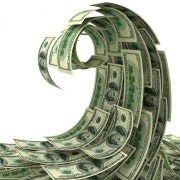Wall St titans hedging integrity out of the market
There is little ambiguity about the ultimate target of investigators and prosecutors in their seven-year campaign to halt insider trading by hedge funds on Wall Street. He is “Portfolio Manager A” in Friday’s historic $US614 million settlement with SAC, the highly successful $US15 billion fund.
Portfolio Manager A is not named in the Securities and Exchange Commission suit, but he is identified as “the owner and founder of SAC”. The owner and founder of SAC is Steve Cohen, and his innocence has become the key to whether the industry can retain a reputation for skill, rather than illegality. Mr Cohen denies wrongdoing. SAC neither admitted nor denied the SEC charges.
The industry’s image has already been tarnished by the SEC and Department of Justice inquiry, which has revealed shocking behaviour on a wide scale. Those jailed include Raj Rajaratnam, founder of the Galleon fund, and Rajat Gupta, the former head of McKinsey and a Goldman Sachs board member, who leaked him information.
As Mary Schapiro, the former chairwoman of the SEC, put it: “there is nothing wrong with doing tremendous due diligence” before hedge funds buy or sell shares. But too many of those working for funds or acting as their informants have strayed beyond this. Instead of analysing the kind of information available to any diligent investor, they have ferreted out private titbits on such topics as drug trials and technology sales.
Among the problems with these transgressions is that hedge funds form an ever more powerful part of the financial industry. The crackdown on investment banks since 2008 is accelerating the transfer of power towards asset managers.
Even before then, the biggest rewards accrued to fund managers rather than brokers. While bank bosses and their most valuable employees might get bonuses of tens of millions of dollars a year, members of the hedge fund elite were worth hundreds of millions – or billions.
The regulatory squeeze on trading and risk-taking within banks through new regulations has pushed them further towards the financial fringe.
This has advantages for the system as whole – hedge funds are not too big to fail, and many do. Taxpayers are not forced to underwrite the risks taken by traders at funds that make mistakes. Instead, hedge funds are genuinely entrepreneurial and self-supporting.
But they are also lightly regulated and charge their investors very high fees to participate. They must keep producing exceptional returns in order to remain in existence, which in turn puts portfolio managers under pressure to do whatever it takes to gain their 'edge'.
In the emerging financial world, hedge funds are not only the most rewarding places to work, but are also Wall Street’s best customers. Equity funds such as SAC pay high commissions to investment banks to be first in line for information.
They also pay other intermediaries – notably the 'expert networks' now drawn into the insider trading investigation. These consultants charge funds to connect them with executives, who are supposed to provide insight into their industries.
In practice, some seem to have provided more: inside information into product development. In the SAC case, Sidney Gilman, a neurologist overseeing a trial of an Alzheimer’s drug, is accused of disclosing results to Mathew Martoma, a fund manager linked to SAC, before these were publicly disclosed. Dr Gilman is now co-operating with the authorities in a non-prosecution deal.
Is this kind of activity occurring within other hedge funds? Rather than being exceptionally skilled, are they instead high-octane and high-pressure operations in which some fund managers pay industry insiders for illicit information?
If so, the regulation of the past five years is having one extremely unintended consequence. It is pushing moneymaking from large, supervised institutions into a financial Wild West of dubious legality. Hedge funds need only look at banks – or Fleet Street – to witness the severe effects of an industry being discredited over the sins of some institutions. The same is in danger of happening to them.
Portfolio Manager A maintains his innocence, despite SAC agreeing to pay the biggest insider trading fine levied by the SEC. Not only his reputation, but that of his industry, now rests on it.
Copyright The Financial Times Limited 2013.
















